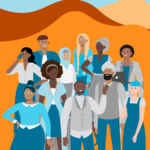Lifelong Learning and Upskilling The modern world is changing at an unstoppable rate. People’s need to keep learning throughout their lives is growing due to societal changes, employment market shifts, and technological improvements. The days of formal education ceasing after high school or college are long gone. Rather, we live in a time where continuing education and improving one’s skills throughout life are necessary to remain competitive. And adaptive in both personal and professional spheres. This article examines the ideas of upskilling and lifetime learning, as well as their importance, practical application techniques. And prospects for ongoing education.

Understanding Lifelong Learning
The continuous, deliberate search of knowledge for one’s own or one’s career’s advancement is known as lifelong learning. It includes both official education—like degree programs or certifications—and informal education—like self-study, workshops, or learning through hobbies. The core values of lifelong learning include curiosity, flexibility. And a desire to advance in a world that is changing quickly.
Key Characteristics of Lifelong Learners
Self-Motivation: People who are lifelong learners frequently have a self-driven nature and actively look for new opportunities to learn.
Adaptability: They welcome new concepts, methods, and abilities because they know that being flexible is essential to remaining current.
Curiosity: People who are lifelong learners are naturally curious about the world they live in. Which inspires them to research a variety of subjects.
Resilience: A key component of lifelong learning is the capacity to accept obstacles and failures. Failures are seen as chances for improvement by lifelong learners.
The Growing Importance of Upskilling
Upskilling is the process of acquiring new skills or honing current ones in order to stay competitive in one’s line of work. It is frequently prompted by shifts in the norms of the sector, new developments in technology. Or the desire to take on challenging tasks at work. Upskilling is especially crucial in sectors like education, healthcare, finance, and information technology that are rapidly changing.

Key Drivers of Upskilling
Technological Advancements: Many jobs now require a greater level of technical competence due to the advent of automation, artificial intelligence (AI). And machine learning.
Globalisation: Because business is conducted globally, professionals must have the abilities necessary to collaborate with people from different backgrounds. And across borders.
Changing Workforce Needs: As companies adapt to market needs, so do the skill sets that workers must possess.
Industry Disruption: The need for specialised skills is fuelled by the advent of new businesses like blockchain technology and renewable energy.
Lifelong Learning and Upskilling Strategies
A systematic method is needed to implement lifelong learning and upskilling strategies effectively. The following are some tactics that both people and organisations can use to adopt this continuous learning culture.

For Individuals
Personal Learning Plans: Creating a plan with precise objectives, sources, and due dates keeps people motivated and focused. This can involve reading, workshops, online classes, and practical assignments.
Online learning platforms: By providing courses in a variety of subjects, frequently at reasonable prices and with flexible schedules, platforms such as Coursera, edX, LinkedIn Learning, and Udemy have increased accessibility to education.
Certifications and microcredentials: Micro-credentials and other short-term, focused learning choices let students gain particular abilities without committing to a long-term program. Employers frequently accept these certifications as evidence of skill.
The Role of Technology in Lifelong Learning and Upskilling
The way we approach learning has fundamentally altered as a result of technology, becoming more flexible, accessible, and personalised. Some of the most influential technologies influencing upskilling and lifetime learning are listed below:
a. Virtual Education Environments
As previously said, online learning environments have democratised education by enabling people to learn from anywhere in the world, at their own pace. These platforms include a huge selection of courses, ranging from personal development to programming, and they frequently include interactive features like projects, peer reviews, and quizzes.

Conclusion
The world is changing at a never-before-seen rate, making upskilling and lifelong learning necessary for both professional and personal growth. Because of the rapid changes in technology and the global interconnection of society, people need to constantly broaden their skill sets and adjust to changing circumstances. The dedication to growth, whether via traditional schooling, online courses, or self-directed learning, enables people to maintain their professional competitiveness and fulfilment.
FAQs
What is lifelong learning?
The term “lifelong learning” describes the persistent, self-driven search of knowledge for one’s own or one’s career’s advancement throughout one’s lifetime. It entails learning new competences, abilities, and knowledge—often outside of established educational institutions.
Why is lifelong learning important?
People can adapt to new problems, stay relevant in a world that is changing quickly, and continue to grow both personally and professionally with the support of lifelong learning. It develops the critical thinking, inventiveness, and adaptability that are essential for success in today’s world of work and personal relationships.
What is the difference between lifelong learning and upskilling?
All types of lifelong learning are included, regardless of whether they are pursued for professional or personal reasons. On the other hand, learning new or advanced skills to improve job performance and career chances is particularly referred to as upskilling.
How can lifelong learning help in my career?
Your capacity to adjust to changes in your industry is improved by lifelong learning, which raises your employability and competitiveness. Gaining new skills puts you in a position to advance in your profession and take advantage of new job and career shift chances as sectors change.
How has technology impacted lifelong learning and upskilling?
With the use of online learning platforms, mobile learning apps, AI-driven adaptive learning systems, and virtual and augmented reality technologies, technology has increased accessibility to lifelong learning and upskilling. With the use of these technologies, people may access a wealth of information from any location and learn at their own pace.



